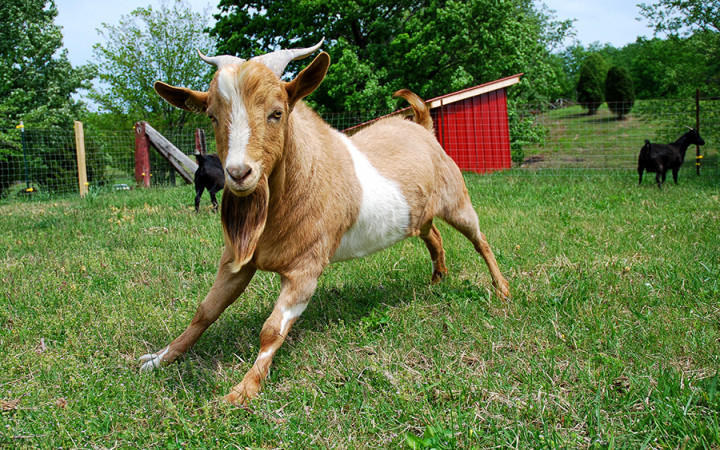Today’s Wonder of the Day was inspired by Abby. Abby Wonders, “Why do fainting goats faint?” Thanks for WONDERing with us, Abby!
We were passing through the Wonderopolis farm yard the other day when we overheard an interesting conversation between some of the farm animals:
Pig: Hey Shawn! Want to see something really funny?
Sheep: Sure, Pete! What's up?
Pig: Watch what happens when I sneak up and scare this goat! Boo!
Goat: Ack! Ouch! Stop that!
Sheep: Ha ha! He totally fell over like he fainted! You got him good, Pete!
Goat: Yeah yeah yeah…very funny. Everybody scare the fainting goat. How original!
We had to get going to a meeting with Farmer Fred, so we didn't get to hear the rest of the conversation. Watching the goat fall down when the pig startled him did get us to WONDERing about what was going on, though. Do all goats faint like that when they get scared?
If you've spent much time on the Internet in the past five years or so, then there's a better than average chance that you've probably seen a video of a fainting goat. While it might not be a lot of fun for the goat, you have to admit it's pretty funny to watch.
Not all goats faint. Those that do exhibit this peculiar behavior are members of a special breed that goes by a variety of names. Most often you'll hear them referred to as Myotonic goats or Tennessee fainting goats. Some of the other nicknames used for this breed include Tennessee meat goats, wooden-leg goats, stiff-leg goats, nervous goats, fall-down goats, and scare goats.
So what's the deal with these goats? Are they overly dramatic and prone to fainting at the slightest provocation? Not at all! In fact, fainting goats don't actually faint when they fall over. They remain conscious the entire time.
Myotonic goats are born with a congenital condition called myotonia congenita, which is also known as Thomsen's disease. This condition causes their muscles to seize up when they're startled. This results in their falling over as if they fainted upon being scared.
This unique condition interferes with a goat's normal fight-or-flight reaction. If you've ever been startled, you've experienced something similar. Your natural fight-or-flight reaction kicks in and your muscles seize up suddenly.
In a normal fight-or-flight reaction, your muscles will release quickly, allowing you to either defend yourself (fight) or run (flight). If you're a fainting goat, though, your muscles don't release quickly. They seize up and stay that way for several seconds up to a minute or more. With suddenly stiff legs that won't release, fainting goats end up falling over as if they fainted.
Fortunately, this process usually doesn't hurt fainting goats, and they rarely experience any pain or injury from these spells. Younger goats tend to be more susceptible to falling over. As goats mature, they're often able to learn how to remain standing on their stiff legs.
Goats aren't the only animals that can have myotonia congenita. Several other species, including mice and even human beings, can have this condition. Because of their four-legged, stocky bodies, though, goats are the only animals that tend to be prone to falling over.
Moreover, goats are the only breed of animal specifically bred to maintain this condition. While Myotonic goats are known as a hardy breed of goat often raised for their meat, they're increasingly bred for their genetic condition that makes them a unique and amusing pet.
While some people disagree with raising Myotonic goats to be pets, it's a good thing that humans continue to raise them. Without humans specifically raising them for meat or as pets, it's likely that Myotonic goats would have disappeared long ago due to natural selection. If they fell over every time a predator appeared, they would be killed and go extinct eventually!





